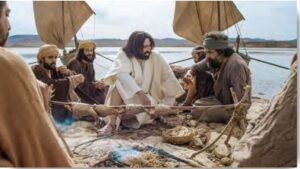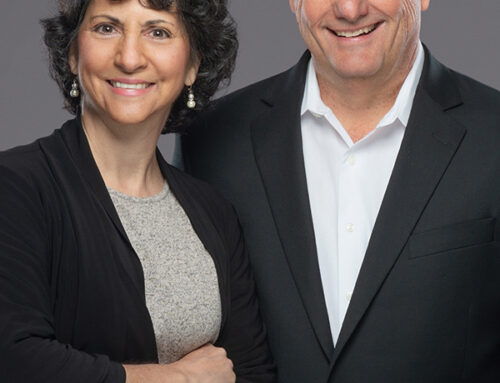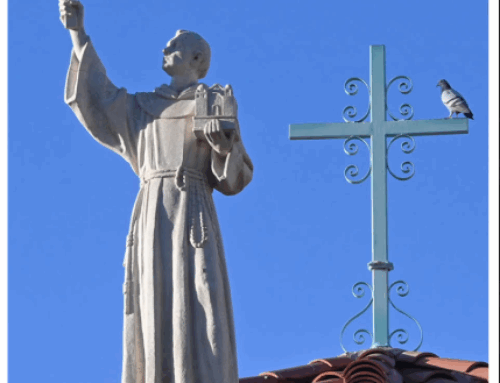(This article originally appeared in the Summer 2022 Issue of TAU-USA #106)
by Kathleen Molaro, OFS
Franciscan Youth and Young Adult Commission Chair
 We spent our fifth and last evening gathered around the campfire at the beach with the 20 or so youth at our annual trip to Santa Cruz. Each night had ended with a special prayer service. As I handed out the prayer aid, one of the young people turned to me and blurted out, “Another prayer? Have you always been this holy?” The comment elicited a laugh from all of us.
We spent our fifth and last evening gathered around the campfire at the beach with the 20 or so youth at our annual trip to Santa Cruz. Each night had ended with a special prayer service. As I handed out the prayer aid, one of the young people turned to me and blurted out, “Another prayer? Have you always been this holy?” The comment elicited a laugh from all of us.
“Actually, no,” I answered. “Let me tell you a story.” I admitted to the rapt group that in college I had left the Church for several years. I told the shocked teens that there were many reasons I’d stopped attending Mass, including disillusionment, a busy college life, and lack of a faith community.
I finished the story about how after I graduated, I returned home for a while. I befriended a priest who had started a Bible group for young adults. We enjoyed many lively discussions. One day I spoke of my loneliness and desire to return to my college friends in San Diego. Father suggested, “It’s not your friends you long for, it’s a relationship with God. Only God can fill that emptiness you feel.” With his encouragement, I went to reconciliation the next day and with several of my new friends attended Mass for the first time in three years.
The casual setting around the crackling fire and my honest sharing, surrounded by darkness and trees, invited the youth to open up. We talked about what holiness meant. Many of them felt going to Church was simply an obligation. Others told stories of faith reflecting their deep understanding of Eucharist. A few admitted to feeling an emptiness just as I had. We ended our prayer that night with joy, knowing our youth group was a safe community of love in which all of us could grow spiritually.
Telling stories (parables) was Jesus’ favorite way to teach and draw others into his fold. People gathered in throngs to hear what he had to say and to speak to him. Churches too should be places where people come to hear the story of God and to tell their own. That’s how we discover what it means to live gospel lives.
Pope Francis spoke of the need for sharing stories at the opening of the recent Synod. “Each encounter requires openness, courage, and a willingness to let ourselves be challenged by the presence and the stories of others,” he stated. “Whenever we listen with the heart, people feel that they are being heard, not judged; they feel free to recount their own experiences and spiritual journey”
(Pope Francis, Homily at opening Mass of Synod 2021-2023).
Each one of us has a unique story, just as each one of us is on a journey of faith, no matter what our age. God is active in our lives, and we, along with our younger Catholic brothers and sisters, can deepen our faith through these journey stories. People love stories, especially those that are meaningful and true. Our stories matter.
Recognizing and respecting the need for good listening is equally important. In Sons and Daughters of Light, our bishops explain, “We are called to hear their pain… and to be open to learn from their experiences, anxieties, uncertainties, and honest constructive questioning. Young adults need opportunities to share their stories and be affirmed in the importance of their lives within the Church.”
Pope Francis encourages us with this same sentiment. “We must remember that prayerful discernment must be born of a readiness to listen to the Lord and to others, and to reality itself, which always challenges us in new ways” (Pope Francis’ Encyclical, Gaudete et Exultate, 172).
Sounds a bit scary, right? But the benefits far outweigh the fear we may feel. The commission urges you to open your hearts and pray for the courage to introduce yourself to a young person. Spend time getting to know them. Be loving. Be authentic. Hear their story and be willing to share your own. Isn’t that the kind of Church we want to belong to?
Image: The encounter with the living Jesus Christ” is “the path to conversion, communion, and solidarity” (Ecclesia in America, 1999, John Paul II).



Thanks be to God for that empty feeling, eventually we recognize God is trying to tell us something.
Small group faith sharing is the life-blood-center of trusting, faith communities – it may be that the Holy Spirit is returning us to “house churches” like when we followed “The Way” as taught to us by Jesus, the Christ, who said “I am the way, the truth, and the life.”